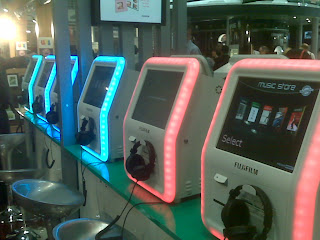
Nokia-branded kiosks are starting to appear in Carphone Warehouse stores in the UK. They are being used to promote their Pixie Lott Illuvial range of phone designs.
The kiosk is sleek and attractive. It invites customers to "touch the one you love" and has limited touchscreen interactivity - giving more detailed information. It also has three sample handsets, which are securely fastened to the front of the kiosk.
Nintendo is also installing new touchscreen and camera-activated information kiosks in gaming stores. Customers are able to access information about Nintendo titles, game recommendations, sales figures and upcoming releases. They will also be able to hold up a DS or Wii title to the station’s camera to see a trailer for that game.
These are the latest examples of a relatively new trend in retail kiosks - units that are placed in store to promote a particular brand. We think this application of interactive technology will grow significantly in 2010. We know that some major corporations are already thinking about deploying their own kiosks. They recognise the benefits of being able to control the way that their product is promoted and, if they also implement remote kiosk management, of being able to update that presentation quickly and consistently in every location.
NeoProducts is very well qualified to design an manufacture such kiosks. We have a great design team and years of experience in implementing remotely-controlled interactive kiosk solutions. We know how to make customers "love the one they touch!".




